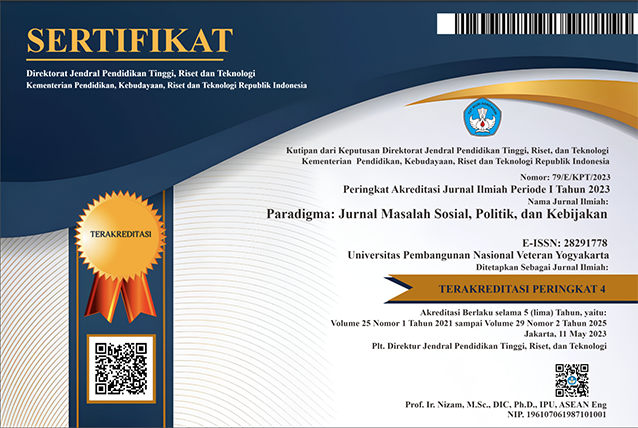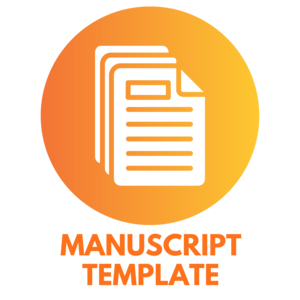POTENSI, EFEKTIVITAS DAN KONTRIBUSI PAJAK HOTEL TERHADAP PENDAPATAN ASLI DAERAH KOTA YOGYAKARTA
DOI:
https://doi.org/10.31315/paradigma.v23i2.5017Keywords:
Potential Analysis, Effectiveness, Contribution, Hotel Tax, Regional Original RevenueAbstract
This study aims to determine the potential hotel tax that actually has in
Yogyakarta City, how far the level of hotel tax effectiveness and how much the hotel tax contribution in the City of Yogyakarta. This research is included in the type of quantitative descriptive research. The population in this study are all hotels in the city of Yogyakarta. The data used in this study are secondary data obtained from the Regional Finance and Assets Agency, Yogyakarta Central Statistics Agency. The sampling technique used is non probability sampling by means of purposive sampling based on selected criteria. The analysis technique uses the analysis of hotel tax potential calculations, analysis of hotel tax effectiveness calculations and analysis of hotel tax contribution calculations.
The results of this study point out that the comparison between hotel tax potential with the realization of hotel tax revenue within five years is from years 2011-2015 there is a big difference, with a potential hotel tax of Rp. 425,219,891,636 and realized hotel tax revenue of Rp. 335,529,045,226, then the local government lost the potential of Rp. 89,690,846,410, from the two hotel classifications in the city of Yogyakarta star hotels that have a greater proportion of potential than non-star hotels. The level of effectiveness shows that hotel tax revenue shows the average percentage is still below 100% with the criteria "Not Effective" so that it can be concluded that the realization of
hotel tax revenue in the city of Yogyakarta has not yet reached the maximum potential, while the level of hotel tax contribution to local revenue in The city of Yogyakarta in accordance with the targets set by the local government shows a percentage above 4% with the criterion "Very Contribute", so it can be concluded that the hotel tax contribution also contributes greatly to local original income in the city of Yogyakarta
References
Mardiasmo. 2002. Otonomi Daerah dan Manajemen Keuangan Daerah,
Yogyakarta: Andi
Perpajakan. Edisi revisi, Yogyakarta: Andi.
Prakosa, K. B. (2005). Pajak dan Retribusi Daerah. Yogyakarta: UII Press.
Siahaan, Marihot P. 2010. Pajak Daerah dan Retribusi Daerah-Edisi Revisi. Jakarta:
PT Rajagrafindo Persada.
Suandy, Erly. 2005. Hukum Pajak. Jakarta: Salemba Empat.
Sugiyono. 2007. Metode Penelitian Bisnis. Bandung: Alfabeta.
Waluyo, 2008. Perpajakan indonesia. Jakarta: Salemba Empat.
Ardhiansyah, D., Rahayu, S. M., & Husaini, A.(2014).Analisis Potensi Pajak Hotel Dan
Pajak Restoran Dan Kontribusinya Terhadap PAD. Malang: Universitas
Brawijaya.
Ardiles. (2015). Analisis Potensi dan Kontribusi Pajak Hotel Terhadap Pendapatan Asli
Daerah Pemerintah Kota Padang. Padang: Universitas Negeri Padang.
Arditia, Reza. (2012). Analisis Kontribusi dan Efektivitas Pajak Daerah Sebagai Sumber Pendapatan Asli Daerah Kota Surabaya. Surabaya: Universitas Negeri
Surabaya.
Pujiasih dan Wardani. (2014). Analisis Potensi, Efektivitas dan Kontribusi Pajak Hotel
Terhadap Pendapatan Asli Daerah Kabupaten Sleman. Yogyakarta :
Universitas Sarjanawiyata Tamansiswa.
Sugiarto, Y., Danurdara, A. B., & Rofi, N. (2015). Analisis Potensi Pajak Hotel Di
Kabupaten Pemalang Jawa Tengah. Bandung: Sekolah Tinggi Pariwisata
Bandung.
Downloads
Published
How to Cite
Issue
Section
License
The manuscript submitted to Paradigma: Jurnal Masalah Sosial, Politik, dan Kebijakan journals are released under the license of Creative Commons Attribution-Non Commercial- ShareAlike (CC BY SA) if and when the article is accepted for publication.
We declare that:
- This paper has not been published in the same form elsewhere.
- It will not be submitted anywhere else for publication prior to acceptance/rejection by this Journal.
- A copyright permission is obtained for materials published elsewhere and which require this permission for reproduction.
Retained Rights/Terms and Conditions
Authors retain all proprietary rights to the published works, such as (but not limited to) the following rights:
- Copyright and other proprietary rights relating to the article, such as patent rights,
- The right to use the substance of the article in own future works, including lectures and books,
- The right to reproduce the article for own purposes,
- The right to self-archive the article
The right to enter into separate, additional contractual arrangements for the non-exclusive distribution of the article's published version (e.g., post it to an institutional repository or publish it in a book), with an acknowledgment of its initial publication in this journal Paradigma: Jurnal Masalah Sosial, Politik, dan Kebijakan



